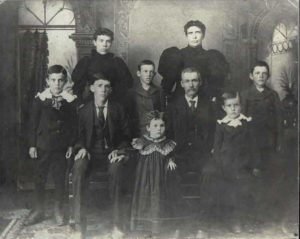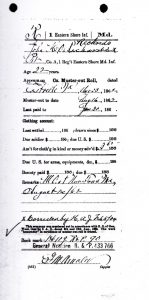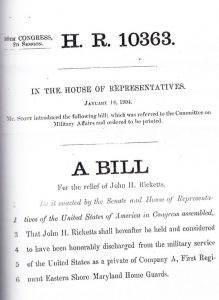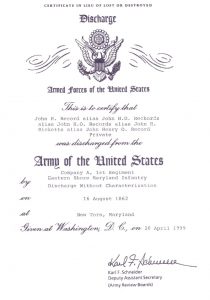
Blame it on expediency and not paying attention, but I’ve misrepresented myself. Yes, I know occasionally we all do such things, but in this instance I need to clarify and correct – so as to set ‘the Record’ (pun intended) straight. It involves a statement I made for my “bio” here at Vita Brevis.[1]
My bio states that I enjoy “helping [my] ancestors to complete their unfinished business” (certainly true) and that I “successfully petitioned the Secretary of the Army to overturn a 150 year old dishonorable Civil War discharge” (not true!). While I certainly did stand at (or was on telephone “hold” with …) the Civil War help desk window for the Secretary of the Army, I was not there for a status update on overturning a “dishonorable discharge.” I was there for something else.
 I was there to overturn a “discharge without honor.” What?! Yes, there is a difference in the terminology. This difference caused me to write many letters, and to stay on hold in the queue – the same queue (I was told) frequented by the Mudd family[2] – to see about correcting an egregious error on my ancestor’s name and military record – from the year 1862. And no, in case you were wondering (as I did), the line at the Civil War help desk window isn’t very long anymore.
I was there to overturn a “discharge without honor.” What?! Yes, there is a difference in the terminology. This difference caused me to write many letters, and to stay on hold in the queue – the same queue (I was told) frequented by the Mudd family[2] – to see about correcting an egregious error on my ancestor’s name and military record – from the year 1862. And no, in case you were wondering (as I did), the line at the Civil War help desk window isn’t very long anymore.
In an earlier post I mentioned inheriting a slew of Civil War pension records, affidavits, etc., etc., (spanning about 60 or so years) from a cousin suffering from Alzheimer’s disease.[3] These documents were given to me for stewardship, and also to see if repairs could finally be made to the honor and name of our ancestor, John Henry Record – known, as it will be seen, by several variants of the surname. You know, family honor is kind of a big deal, even if the issue was over 130 years old.
John Henry “O.” Record[4] mustered in as part of the First Eastern Shore Infantry, Maryland Volunteers, Company A, in September of 1861, to protect Maryland’s borders and (in John’s understanding, anyway) Maryland’s borders only. He served until August of 1862,[5] at which time the war had grown quite fierce, causing Major General John E. Wool to muster out the Maryland Volunteers into the regular army. Many, including my great-great-grandfather, refused General Wool’s order as outside the scope of his authority over the Maryland volunteers.[6] Subsequently, these volunteers were mustered out “without honor.”
Now, I know what this looks like – and while the “variants” to this point of view will always be up for discussion, it was concluded (in 1999) that the only order John H. Record had indeed refused to obey had been an illegal one.[7] In other words, the army had violated their own agreement with the Maryland volunteers, and they could not lawfully compel the volunteers to go into the general army.[8]
 After a re-examination of John’s records, it was determined that there were no criteria available in 1862 to describe the mustering out of the Maryland volunteers. John was wrongfully “discharged without honor” – something different from being honorably or dishonorably discharged. It was under these circumstances that John’s Civil War pension was a) both issued and revoked and b) battled over from the 1880s until the death of his widow in 1942.[9] In fact, John’s 1862 discharge did not meet the requirements for either type of discharge.[10]
After a re-examination of John’s records, it was determined that there were no criteria available in 1862 to describe the mustering out of the Maryland volunteers. John was wrongfully “discharged without honor” – something different from being honorably or dishonorably discharged. It was under these circumstances that John’s Civil War pension was a) both issued and revoked and b) battled over from the 1880s until the death of his widow in 1942.[9] In fact, John’s 1862 discharge did not meet the requirements for either type of discharge.[10]
Well, I couldn’t just let it all lie, now could I? After all, when Cousin Barbara passed the torch to me by handing me a foot-tall stack of John’s Civil War paperwork in the late 1990s, the game was still on. So I did what any other decent great-great-grandson would do. I tore into it.
 First, I had to make sure that the Department of the Army knew my family wasn’t after any “back pay” from his revoked pension. I knew we’d never move forward if they thought this was about getting some sort of “grandfathered-in cash” settlement (though a trip to the National Archives might have been nice!). Then, I re-submitted John’s original case arguments for review. I needed to make them see that the original order had been issued illegally – and that John did not deserve the discharge he had received.
First, I had to make sure that the Department of the Army knew my family wasn’t after any “back pay” from his revoked pension. I knew we’d never move forward if they thought this was about getting some sort of “grandfathered-in cash” settlement (though a trip to the National Archives might have been nice!). Then, I re-submitted John’s original case arguments for review. I needed to make them see that the original order had been issued illegally – and that John did not deserve the discharge he had received.
The merits of my great-great-grandfather are better left for future generations to decide. However I was pleased when after reviews of John’s discharge it was upgraded after 137 years, to a discharge that is now termed “uncharacterized.”[11] It was not the “honorable discharge” I had hoped for, but it was an improvement none the less. Maybe now my ancestors will let me get some sleep at night! I have done the best I could give the 130-plus years in between.
“And now you know the rest of the story…”[12]
Notes
[1] Vita Brevis author bio.
[2] Dr. Richard D. Mudd (1901–2002), whose family papers were donated to the Georgetown University Library, Booth Family Center Special for Collections, to clear the name of his grandfather Dr. Samuel Alexander Mudd (1833–1883), who treated John Wilkes Booth after President Lincoln’s assassination.
[3] Jeff Record, “That which we inherit,” Vita Brevis, 23 March 2017, for a mention of Barbara Andruss Irwin (1922–2008).
[4] John Henry “O.” Record (1840–1915), aka John Henry O. Reckords, Records, and Ricketts, with the meaning of the letter “O.” in his name unknown.
[5] History and Roster of Maryland Volunteers, War of 1861-5, First Eastern Shore Infantry, 367: 309, courtesy of the Maryland State Archives and listing service dates for John H.O. “Richards” [Reckords], mustered out by “Special Order” of Major General John E. Wool, dated 6th and August 12th 1862: “The word ‘honorable’ in certificate of muster out roll is erased.”
[6] Department of the Army, Case of John H. Record, deceased, Docket Number AC98-08234, “Proceedings,” 18 November 1998, pp. 1–9.
[7] Quotes in the Case of John H. Record, ibid., “…this unit was not a militia but was mustered into the services of the United States by the governor of Maryland,” “…orders to station or otherwise employ Company A and its members outside of the state of Maryland were in violation of the enlistment or muster contract.”
[8] Ibid., “…The refusal of Company A to follow any such order was appropriate and correct.”
[9] John H. O. Record’s second wife, Hester Schooley (1860–1942).
[10] The Case of John H. Record, op.cit: “The muster out (discharge) is, therefore, not honorable nor is it dishonorable, or without honor.”
[11] Military Discharge of John H. Record, “Certificate in lieu of lost or destroyed,” dated 20 April 1999, “Discharge Without Characterization,” replacing original discharge of 16 August 1862 (at) New Town, Maryland. (Image above)
[12] Paul Harvey Aurandt (1918–2009) “The Rest of the Story,” ABC Radio Networks.
BRAVO! Your Persistence is commendable.
Good work!
Wordsmithing….what an art. Amazing the amount of time one needs to discern such…..congrats!
Technicalities !!! There probably was a little animosity toward the First Eastern Shore Infantry, Maryland Volunteers, Company A.
I have a question. Shall I ask you now or somewhere else?
My Great Grandfather died August 30, 1862 at David’s Island, NY (New Rochelle). They took the sick and injured from Harrison Landing, VA by train to the northern hospitals to receive care.
I cannot find, anywhere, his parents names. Would you know of any documents from the war or anywhere else that might include his parents names. My brother did DNA for me which narrowed it down, and I have his pension file. My grandfather was three years old when his father died and my father didn’t know who his grandparents were at all. My ggrandfather was in the 85th Pennsylvania Infantry, Company E. I have their book but he didn’t serve very long.
A letter from him to his wife surfaced in the 1950s and my mother wrote the Archives for info.
Do you have a favorite relative that is special? He’s always been mine…
Just asking…Doris
Doris, let me think on this a bit more – and as for favorites I may have too many to mention here, but my 4th great uncle Samuel Norton Sprague (born c. 1826-1906) always comes to mind. (see the upcoming Summer 2017 issue of Mayflower Descendant for “Uncle Sam’s” story 🙂 …. Feel free to email me at my jeff@therecordfamily.com address and we can chat more about ideas for sources. My guess is you probably know the best places to look already! …..Jeff
I had a similar experience only it was a great, great uncle. My great, great grandfather and four of his half-brothers all served in the Civil War from Massachusetts, New Jersey and New York. My grandfather always said that Sam (one of the half brothers left the Army and “went west and became a horse thief”. Around the time I got really interested in genealogy we were fortunate to inherit a large number of letters that my gg grandfather and other members of his family exchanged during the Civil War. The lettters mentioned that Sam deserted but nothing more about him. I obtained both my gg grandfather and Sam’s pension files. And low and behold Sam didn’t go “west”. He did desert because he wasn’t seeing any action in his unit (Scott’s Guards in Washington DC) and re-enlisted under an alias in place of John Hart, was captured and died in Andersonville. After his death his father, my ggg grandfather applied for his pension, went to court and proved that John Hart was his son Samuel and received the pension. I put together all of the documentation, sent it to Andersonville and his grave records have been changed from John Hart to Samuel Wight. My gg grandfather also died as a prisoner of the Confederacy. The other three brothers survived the war.
Great job Ruth! Good work!